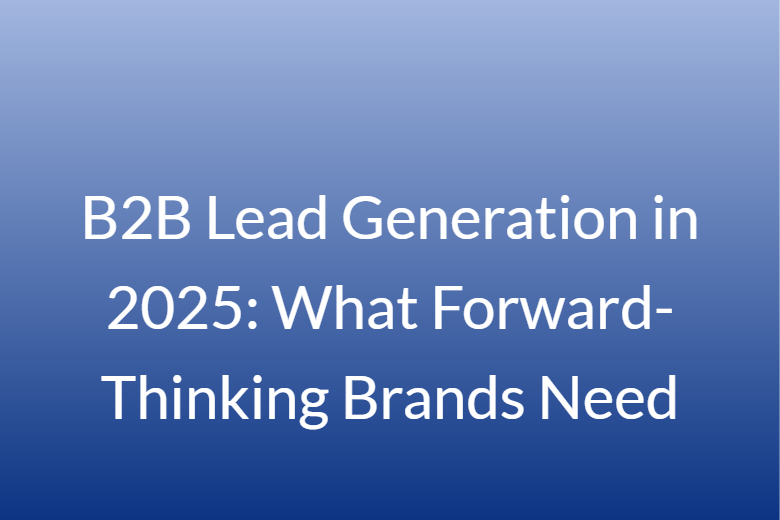The world of B2B Lead Generation is entering a new era in 2025—an era where real-time data, AI-powered insights, and hyper-targeted outreach are setting the tone for competitive advantage. Organizations are no longer relying on traditional marketing channels alone. Instead, the emphasis is on building intelligent lead generation ecosystems that predict buyer intent, personalize every touchpoint, and prioritize lead quality over volume.
Self-Directed Buyers Demand Smarter Engagement
Buyers today complete over 70% of their research before ever contacting sales. This self-directed behavior demands a new approach to B2B lead generation—one that is content-first, educational, and customer-centric. In 2025, marketers must anticipate what information buyers need and when they need it.
To support this shift, organizations are investing in robust content hubs, interactive product demos, comparison tools, and peer-reviewed resources. These digital assets empower leads to move themselves through the funnel—without relying on manual outreach.
Smart CRMs Integrated with Marketing Stack
Customer Relationship Management (CRM) platforms have become far more intelligent in 2025. Today’s CRMs don’t just store lead data; they actively guide marketers on how to engage. Advanced CRMs integrated with B2B lead generation tools are now capable of scoring, segmenting, and recommending next steps using AI.
CRM-driven workflows enable automated follow-ups based on specific lead behaviors—such as page visits, webinar attendance, or email clicks. As a result, teams operate with better alignment and can react faster to signals of intent, increasing the likelihood of successful conversion.
Hyper-Automated Lead Workflows Accelerate Pipelines
Automation is no longer just about saving time—it’s about maximizing opportunity. In 2025, B2B lead generation workflows are deeply automated and responsive to lead behavior in real-time. From the first touchpoint to the last, automation ensures continuity and speed.
Workflows now trigger customized messages based on lead score, content engagement, and sales-readiness. Whether it’s sending a reminder email, scheduling a demo, or delivering a tailored offer, every step is optimized for the lead’s unique journey.
First-Party Data and Zero-Party Data Integration
As third-party cookies phase out, businesses are doubling down on first-party and zero-party data strategies. First-party data—collected through interactions with your website and campaigns—and zero-party data—intentionally shared by leads—are now goldmines for B2B lead generation.
Marketers use interactive forms, preference centers, surveys, and AI-powered recommendation engines to collect and act on this data. By integrating these insights across platforms, businesses can deliver messaging that feels intuitive and relevant.
Buying Committees Require Multi-Stakeholder Messaging
In B2B transactions, purchase decisions are rarely made by a single individual. In 2025, successful B2B lead generation strategies account for buying committees that often include 5–10 stakeholders. Each of these stakeholders has unique pain points and expectations.
To effectively engage buying groups, marketers must develop multi-layered campaigns with role-specific messaging. C-suite executives may prioritize ROI, while mid-level managers focus on functionality. Smart campaigns deliver the right message to the right person in the same account, creating a united front of engagement.
Contextual Retargeting Enhances Conversions
Retargeting in 2025 is all about context. No more blanket ads following users around the web. B2B lead generation strategies now rely on contextual retargeting, which adapts messaging based on the content users viewed, the funnel stage they’re in, and the industry they belong to.
For instance, a lead who visited a solutions page may receive a case study retargeting ad, while one who downloaded a whitepaper might get an invite to a demo. This level of granularity keeps messaging fresh, relevant, and conversion-focused.
Progressive Profiling for Lead Enrichment
Marketers don’t have to ask for all lead information at once. Progressive profiling is becoming a go-to method in 2025 for gathering lead data in a non-intrusive way. As part of B2B lead generation forms, progressive profiling allows additional questions to appear only after initial engagement.
This strategy improves form conversion rates while also enriching lead profiles over time. The more a lead interacts with your content, the more data is collected, enabling sharper segmentation and more meaningful communication.
AI-Driven Content Recommendations Increase Engagement
AI plays a huge role in content delivery in 2025. Content recommendation engines powered by machine learning tailor on-site experiences by suggesting articles, videos, or offers based on user behavior and industry trends. This approach boosts time-on-site and engagement—both critical signals for B2B lead generation success.
Dynamic content blocks within emails and landing pages change based on the viewer’s past interactions, ensuring every lead receives information that directly aligns with their goals and challenges.
Agile Marketing Methods Reshape Campaign Strategy
Speed and flexibility have become core components of modern marketing. Agile methodologies are being applied to B2B lead generation, with small, cross-functional teams executing iterative campaigns based on real-time feedback.
Rather than launching massive campaigns that take months to build, teams now test, learn, and scale what works—often within weeks. This approach enables rapid response to market shifts and ensures strategies remain aligned with buyer behavior and current trends.
Real-Time AB Testing and Smart Optimization
A/B testing is no longer static. In 2025, it’s intelligent and dynamic. AI-enhanced platforms are running real-time variant testing, instantly optimizing content, subject lines, and CTAs to maximize conversion within B2B lead generation programs.
These platforms adjust experiences mid-campaign, eliminating guesswork and ensuring optimal performance. With heatmaps, scroll tracking, and session replays, marketers are empowered with the insights needed to continuously refine digital experiences.
Read the Full Blog Now @ https://acceligize.com/featured-blogs/the-future-of-b2b-lead-generation-trends-you-cant-ignore-in-2025/
About Us
Acceligize is a global B2B demand generation company, specializing in delivering high-quality leads and data-driven marketing solutions for modern businesses. Leveraging AI, content syndication, and targeted outreach strategies, Acceligize empowers B2B organizations to accelerate pipeline growth and increase ROI. As industry leaders in multichannel lead generation, our mission is to help you reach the right audience with the right message at the right time.
